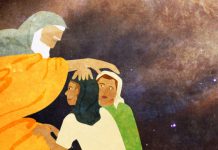The Laws of Judges, Witnesses, Officers and Kings
“Please purchase a tin of snuff,” Rabbi Weiss requested from his attendant. Meanwhile, Ralph and Jake were two litigants waiting in the rabbi’s foyer for him to judge their case involving a large sum of money.
Ralph overheard the rabbi’s request and whispered to the attendant, “I know of a place to acquire aromatic snuff very cheaply, please allow me to run out and purchase the rabbi’s snuff.”
When Ralph bought the snuff, he inserted a tiny gold coin beneath the snuff. Since this constituted a bribe and “bribery blinds the eyes of the wise” (Deut. 16:19), the rabbi decided in favor of Ralph – even though he was unaware of the bribe.
When Jake, his opponent, appealed the ruling to the other learned judges, they all agreed that Jake was obviously correct and they didn’t hesitate to inform Rabbi Weiss of their learned opinions.
That night, the rabbi couldn’t fall asleep. “How could it be that all of my colleagues disagree with my legal decision when it seems so clear to me?” He decided to review the sources again, and opened his large volumes of the Talmud and the Code of Jewish Law. He went over the case again, and each time came to the same conclusion. “The others must be mistaken. Ralph is the winner,” he said to himself.
As he was concentrating on his studies, he paid little attention to the tin of snuff from which he was constantly sniffing. He finally finished the tin and gave a little tap on the back to get the last drops, when out came flying the gold coin. “Aha!” cried the rabbi, who then realized what had happened and that Jake was right. He had been blinded without even knowing of the bribe!
Parshat Shoftim continues Moses’ “law-giving” process, which now focuses on the laws of judges, witnesses, officers and kings.
_______________
THE JUDICIAL SYSTEM
Every Jewish community must have a judge, and officers to enforce the verdict. The judge must rule fairly and not take bribes. The rabbis of the Talmud were very sensitive to this matter and disqualified themselves often for what they perceived to be bias. One man who helped a rabbi cross a bridge, a woman whose tears caused an emotional bias, and even the sharecropper who delivered the rabbi’s share a day early, all resulted in the rabbi disqualifying himself from the case. (Compare this to many politicians and judges today who claim to be unbiased – in spite of receiving gifts from all sides!)
_______________
COGNITIVE DISSONANCE
If someone has a particular bias, even subconsciously, not to believe certain facts, it is very difficult to convince them otherwise. Most people are not aware of this, as it can be very subtle. One college professor told a rabbi who was delivering a lecture: “I want you to stop speaking right this minute. If you continue I might have to change my lifestyle – and I like my lifestyle!” (heard from Rabbi Yaakov Weinberg)
Aristotle was brilliant, yet he denied monotheism and creation ad nihilo.
Question: How can we expect a young Jewish boy or girl to be greater then Aristotle?
Answer: One need not be Aristotle to perceive the design in the universe. Every human who decides to use his intelligence can easily recognize the Creator!
Question: So why didn’t Aristotle perceive this?
Answer: Cognitive dissonance! “Bribery blinds the eyes of the wise.” Since believing in a Creator obligates one to live a moral lifestyle, many choose to believe otherwise. Even a man as great as Aristotle was no exception and his bias blinded him. (Rabbi Elchanan Wasserman)
_______________
RIGHTEOUSNESS RIGHTEOUSNESS SHALL YOU PURSUE
The Torah’s repetition of the word “righteousness” is to impress upon us that even the means to reach righteousness must be decent. In Torah, the ends do not justify the means.
_______________
WITNESSES
In biblical times, there were no “squad cars” searching for evildoers to bring to justice. The officers only carried out the verdict of the judiciary. Whose job was it to make sure the masses kept the Torah? Every two adult male Jews, upon witnessing a Jew about to break the Torah, had to duly warn him of the consequences of his foolhardy act. If he proclaimed his intention to do it anyway and did so without delay, they had to bring him to the Jewish court and demand punishment.
If none of the people acted as witnesses, the Almighty blamed the entire nation for their inaction (see Parshat Pinchas).
_______________
JUDGES
The Torah commands us to follow the opinion of our judges, “whether they tell us right or left.”
In Temple times, the great Sanhedrin (supreme court) had complete jurisdiction in all matters. When a question arose, they would deliberate, and only when the issues involved were “crystal clear” would they come to a vote, which was binding on the entire nation. Today, each group of Jews follow their chosen rabbi, which unfortunately often leads to disagreements among Jews.
_______________
“TORAH OPINION”
There is a concept that a great Torah scholar, who has dedicated his life to the study and dissemination of Torah, eventually starts to think in the “thought patterns” of the Torah. Hence his opinion, even on worldly topics like business, medicine and even politics, is highly sought after and valued. This is the reason why religious parties in Israel have a “Council of Torah Sages” who formulate policy for the politicians.
An ignoramus once asked the rabbi: “How do you arrive at a ‘Torah opinion’?” His uncharacteristically blunt reply was: “Think through the issue well, and decide what your unlearned mind considers the best possible action – and then do the opposite. This is most likely the ‘Torah opinion’!” The rabbi was explaining that without the broad moral perspective of Torah, a person will often conclude what is in the interest of their own personal bias, without seeing the greater moral truth.
_______________
THE JEWISH KING
The Torah commands us to appoint a monarch. Unlike most monarchs in history who were mainly concerned with themselves, the Torah considers a benevolent monarchy – concerned with the welfare of the people – to be the best form of government. (Modern political scientists concur in theory; the problem is that politicians are often too untrustworthy to put the people’s needs ahead of their own.)
In spite of this, the Jewish people in biblical times functioned without a king for over 300 years: From Joshua until Saul, the Judges ruled the nation. When the people approached the prophet Samuel and requested a king, he was very saddened, “Isn’t God your king?” God appeared to Samuel and comforted him: “It isn’t you they’ve rejected, but Me!”
Question: What was Samuel so upset about? Doesn’t the Torah specifically command us to appoint a king?
Answer: The period of the Judges was characterized by the entire nation functioning by the “honor system.” Judges had no police force or army to enforce their decisions. The Book of Judges records two calamities that were a result of the absence of a king to enforce this authority on the nation. However, by any standard, two incidents in 300 years is an excellent track record! What would occur in New York City even one day without a police force? (Or even with a police force!)
God was aware that eventually the nation would need a central authority and therefore commanded a king. However, in the times of Samuel, the people could have held out longer. They wanted a king for ceremonial reasons, the pomp and glory of the “changing of the guard.” This was considered rejecting God. (Rabbi Avigdor Miller)
_______________
LIMITATIONS OF THE KING
The purpose of the monarch was to raise the spiritual level of the people. He is commanded to have a small Torah scroll with him constantly and to read from it.
The king also had to display great humility. The Amidah prayer contains four blessings where we bow down. The High Priest had to bow at every one of the 19 blessings. The King would pray the entire prayer prostrating himself. The Torah teaches that the more reason one has to be arrogant, the more he must work to counteract that tendency.
The Torah limits a king in 3 areas: He may not have an abundance of wives, horses, and silver and gold. This is to prevent him from overindulging and seeking only more power. King Solomon had 1,000 wives. His intention was to unite the entire world and teach them morality. What better way to get on the good side of a gentile king, than by marrying his daughter? Solomon assumed that the reason the Torah gives, that “they shall not turn his heart away from the Lord” (Deut. 17:17) if it did not apply to him (since God granted him wisdom), it is permitted.
The rabbis strongly condemned Solomon’s decision, saying that there may be other reasons for a Mitzvah that you don’t understand! In the end, one of the wives practiced idolatry in the palace and Solomon was held accountable.
_______________
GIFTS TO THE KOHEN
In the days of the Temple, Jews were obligated to give to the Kohen a total of 24 gifts, including:
- When a Jew slaughtered an animal he had to donate the arm, cheek and stomach to the Kohen. This symbolized dedicating ones actions, words and enjoyments to God. (Rabbi Hirsch)
- The “trumah” portion of the grain.
- The first fleece of the lambs.
The concept is to feel gratitude to God for every gift we receive, and to show our gratitude by donating to those who represent Him. The fact that the Kohen and Levi were subject to the generosity of the nation and had no assets of their own, put them in a very precarious position. The Israelite had the choice which Kohen or Levi to donate to, and any individual Kohen or Levi could starve if no one liked him!
It is pointed out that this “selectivity” clause does not make the descendents of Aaron the likely authors of the Bible. Neither would the dynasty of King David – who clearly relates his mistakes more than anyone else! In short, by process of elimination, the only author of the Bible who could be totally objective is the Almighty Himself!
_______________
BLACK MAGIC
Besides prophecy, there is a “back door” for obtaining knowledge of the future. The Torah prohibits patronizing fortune tellers, soothsayers, star gazers and palm readers. We are admonished to be “In complete faith with the Lord” (Deut. 18:13). This means trusting in God, for better or for worse. We don’t always understand His plan, but knowing that enables us to deal with all situations. This awareness raises the Jewish people above all forms of “black magic.”
_______________
COPYRIGHT LAWS
“Do not move the border markers” (Deut. 19:14). This means don’t sneak late at night and move the divider between your field and your neighbor’s field – even a little bit. After a few such moves the loss can be substantial. This can be applied to plagiarism in its many forms, as well as copyright laws and all the realms of unfair competition.
_______________
FALSE WITNESSES
In a Jewish court, the most reliable form of evidence are two adult male witnesses. If two sets of witnesses contradict each other, they cancel each other out. (See Parshat Shlach concerning the 10 spies against the two.)
However, there is one case where the Torah specifically believes the second pair over the first. Imagine that the first pair testified that they witnessed an act at a certain time in a certain place (e.g. “6 a.m. in Miami”), and the second pair declares, “We know that you didn’t see it, because you were with us then in Toronto!” In such a case we believe the second pair, because the first pair cannot testify in their own defense. For just as relatives may not testify for each other, so too an individual is considered related to himself and is self-serving in his own defense.
The Torah decrees that these false witnesses must suffer whatever punishment they intended for the defendant – be it payment, lashes, or even the death penalty! If this cannot be done, they receive lashes for the sin of bearing false witness.
_______________
LAWS OF WAR
What follows are 3 laws concerning the Jewish people waging war (excluding a war of liberation of the land). Two of these laws are in this Parsha, followed by one in the next Parsha, and interrupted by the law of the “broken-necked calf.”
LAW #1: When the soldiers are assembled to join the battle, they are first asked if anyone had recently gotten married, built a new house, planted a new vineyard, or was afraid of his misdeeds. Those who replied positively were exempted from military duty. The concept is that they would make bad soldiers due to the fact they would always be focused on “who will take my wife, house or vineyard if I don’t return?” The sinner has his embarrassment alleviated by grouping him with the others.
LAW #2: When besieging a city, if you must cut down trees to build a platform to attack the city, do not cut down fruit trees. This is environmentalism in the Torah! This is the general prohibition against wasting food or any commodity. (Remember the starving children in Africa and finish your spinach!) The Torah also compares people to trees in the power of growth that they share.
LAW #3: The captive woman is discussed in next week’s Parsha.
_______________
THE BROKEN-NECKED CALF
A homicide victim was found between two cities with a gaping wound. The murderer didn’t even bother hiding his deed. The Sanhedrin from Jerusalem came to measure the closest city, and the elders of that city had to take a young calf that never carried a burden to a valley that was never planted (hinting to the victim who will not have any more offspring), and break its neck. The elders would then wash their hands over the dead calf and proclaim:
“Our hands did not spill this blood, nor have our eyes seen who perpetrated this deed. Have mercy on your people and atone this innocent blood.” (Deut. 21:7)
The meaning of this ceremony was to stress the abhorrence at innocent bloodshed. If someone had so little concern for public opinion that he didn’t even try to hide his deed, this was a breakdown of the first degree. The elders of the closest city were indirectly responsible for not providing provisions for wayfarers (as we assume this victim was), and more basically, for not educating the population of the horror of bloodshed.
Question: Why is this section inserted in the middle of the laws of warfare?
Answer: Soldiers can get accustomed to bloodshed until it makes little emotional impression on them anymore. The Torah wants us to be sensitive to the horror of killing, even when we have to conduct wars. The entire nation, including its leading body of scholars, must be outraged over the finding of one homicide victim (a dime a dozen in many corners of the world!). Take life seriously, and you won’t return from war desensitized to the value of life. (Rabbi Hirsch) This forms the Jewish attitude to this day.
credit to aish.com












